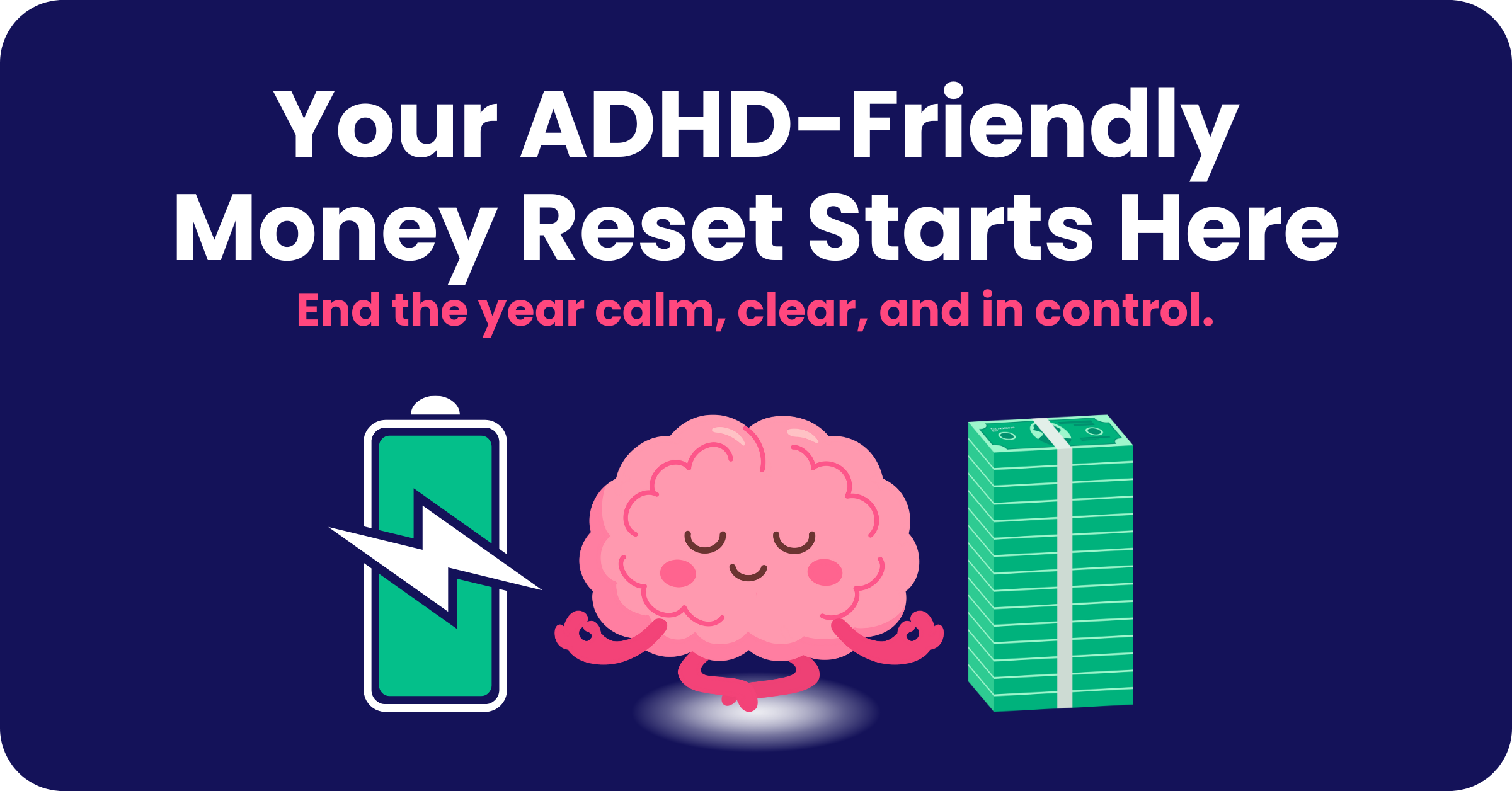The Rewards Scam Hiding in Your Wallet
The Shocking Truth About Your "Rewards" Card Ever wonder why you can't seem to stop swiping that rewards card, even when you know you're...
6 min read
 Dave DeWitt
:
September 2, 2025
Dave DeWitt
:
September 2, 2025
Checking your bank account and seeing random $9.99 charges you can't identify?
You're definitely not alone, people with ADHD lose an average of $273 annually on forgotten subscriptions, but here's what most financial experts completely miss about why this happens.
After helping countless ADHD clients reclaim their financial sanity and personally saving $847 last year using this exact method, I've discovered something that will probably surprise you: your brain isn't broken, and you don't need more discipline.
The real problem? Every piece of traditional advice tells you to "track everything better", which is like telling someone with a broken leg to "just walk normally."
Instead, I'm about to show you a counterintuitive approach that works WITH your ADHD brain's wiring, not against it.
Here's exactly what you'll discover:
This isn't about becoming more organized or disciplined, it's about creating a system so brain-friendly that managing subscriptions becomes effortless.
Ready to stop hemorrhaging money to services you forgot you had? Let's dive into why your current approach is actually working against your brain...
Let's start with something most people don't realize about ADHD and money management.
When financial experts tell you to "just track your expenses better," they're missing a fundamental truth about how your brain actually works.
Your brain isn't broken, the entire financial system is designed against you.
Here's what's really happening in your ADHD brain when you try to manage scattered subscriptions:
The result? What I call "subscription chaos" - charges popping up randomly across different accounts, creating constant financial overwhelm that your brain simply cannot track effectively.
But here's what most people don't realize...
Standard financial advice assumes you have a neurotypical brain with consistent executive function.
Each piece of traditional advice adds MORE complexity to an already overloaded system. It's like trying to solve a traffic jam by adding more lanes, you just create more chaos.
But what if there was a completely different approach?
What if instead of trying to track everything separately, you did the exact opposite and consolidated everything into one simple system?
Here's the counterintuitive solution that changed everything for my clients: consolidate ALL subscriptions onto a single credit card.
This isn't just about organization, it's about designing a system that works specifically with ADHD brain wiring.
Real Example: Sarah came to me drowning in subscription chaos across 5 different payment methods. "I found out I was paying for three music streaming services, two gym memberships I'd forgotten about, and a meal kit service I'd ordered during a hyperfocus episode six months earlier," she told me. After implementing the one-card system, she reclaimed $347 annually, and more importantly she eliminated the constant anxiety of wondering what charges might surprise her next.
Here's why this works when everything else fails:
But here's the part that surprised even me...
There's something deeper happening here that most financial advice completely misses.
ADHD brains struggle with "task initiation" - simply starting overwhelming tasks like reviewing scattered subscriptions.
But when everything is consolidated, you've eliminated the biggest barrier: decision paralysis about where to even begin.
Your brain no longer has to make the executive decision of "Which account should I check first?" Instead, you have one clear starting point.
Dr. Russell Barkley's research shows that ADHD brains need immediate, visible feedback to maintain motivation. The one-card system provides exactly that, because you can literally see your subscription spending in one place, making it concrete rather than abstract.
Plus, there's a psychological phenomenon at work: When you see all your subscriptions listed together, your brain naturally starts evaluating their value. It's like having a subscription audit happen automatically every month.
But here's what really shocked my clients...
That $273 average annual loss? For ADHD individuals, the real number is likely closer to $400-500.
But the money is just the tip of the iceberg. Here's what subscription chaos is really costing you:
I call this the "ADHD Tax" - the extra costs we incur simply due to our neurological differences. Late fees, forgotten subscriptions, replacement costs for lost items, missed early-bird discounts.
But what if you could eliminate this entire category of stress from your life?
Ready to implement this system? Here's how to do it without overwhelming your executive function:
Pick ONE credit card to become your subscription hub. Don't overthink this, any card with decent fraud protection works. The key is choosing quickly and moving forward.
Choose a card you don't use for daily spending. This creates clear visual separation between subscriptions and other expenses.
Don't try to switch everything at once, that's a recipe for ADHD overwhelm.
Instead, use what I call the "encounter method": As you notice subscription charges over the next 30 days, switch them to your dedicated card. This works WITH your ADHD brain's natural patterns instead of against them.
Keep a simple note in your phone: "Switched to subscription card" with the date. That's it. No complex tracking required.
Set ONE monthly calendar reminder: "Subscription card review – 10 minutes max."
The key is keeping it short.
You're not doing detailed analysis, just scanning for services you no longer use. Your ADHD brain can handle 10 minutes. It cannot handle "comprehensive financial review sessions."
But here's where the magic really happens...
This approach creates something deeper than just financial organization, it creates what psychologists call "self-efficacy."
When you implement this system and see it working, you're building evidence that you CAN manage finances effectively. You're just doing it differently than neurotypical advice suggests.
Client testimonial: "For the first time in my adult life, I feel like I have control over my money instead of it controlling me. I'm not more disciplined, I just have a system that actually works with my brain." – Marcus, software developer
The ripple effects are profound:
This shift doesn't just change your bank account, it changes how you see yourself.
This subscription strategy represents a fundamental principle: designing systems that leverage ADHD strengths while accommodating challenges.
Traditional financial advice relies on skills that are genuinely difficult for ADHD brains:
But what if your financial systems could work differently?
The one-card method reduces complexity, creates visual clarity, and removes the need for constant mental tracking, all while giving you BETTER control over spending.
I've discovered something fascinating: ADHD doesn't necessarily cause money struggles. My clients with the most financial success aren't the most organized or disciplined, they're the ones who've learned to work WITH their brain instead of against it.
And that's exactly what this system does.
You now have the complete framework for ending ADHD subscription chaos, a system that works with your brain's wiring instead of fighting against it.
This isn't generic financial advice or guesswork. It's a proven method that's helped countless ADHD clients reclaim both money and mental energy, with an average savings of $400+ annually.
You're equipped with the same strategy that helped:
Of course, knowing this framework and implementing it efficiently are two different things. What took me years to develop through working with hundreds of ADHD clients doesn't have to take you nearly as long.
Like any system change, this becomes automatic with the right guidance and support tailored to your unique situation.
If you want to learn more about creating ADHD-friendly financial systems that actually work, get Unbudget Lite.
It's free tool designed specifically for ADHD brains who are tired of traditional budgeting methods that never stick.
Your relationship with money doesn't have to be a constant struggle.
The subscription chaos ends now. Your financial peace of mind begins today.
-1.jpg)
The Shocking Truth About Your "Rewards" Card Ever wonder why you can't seem to stop swiping that rewards card, even when you know you're...
.jpg)
Struggling with financial management while having ADHD?

Does reviewing your finances make your ADHD brain scream "let's reorganize the junk drawer instead"? You're not broken, your brain just needs...